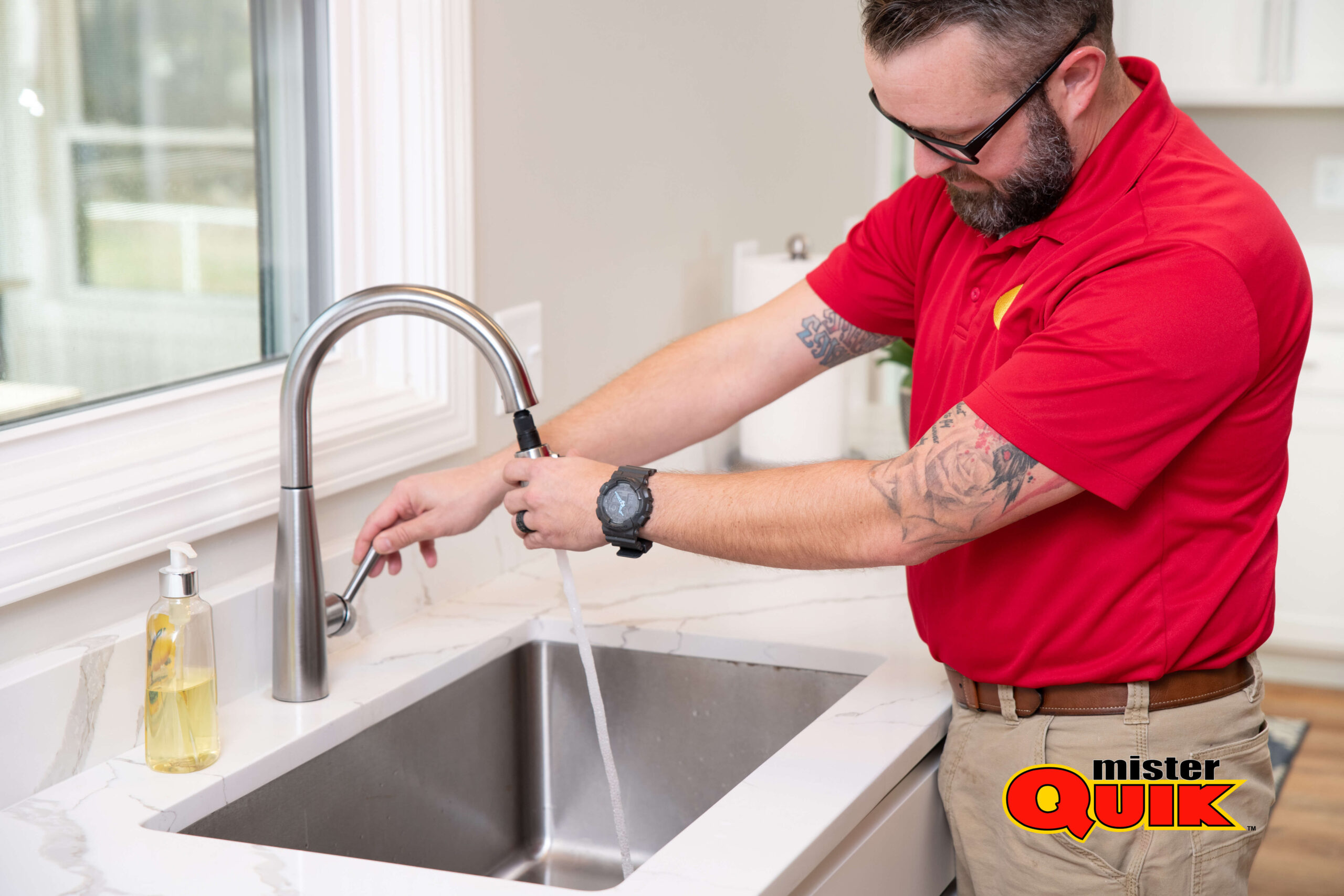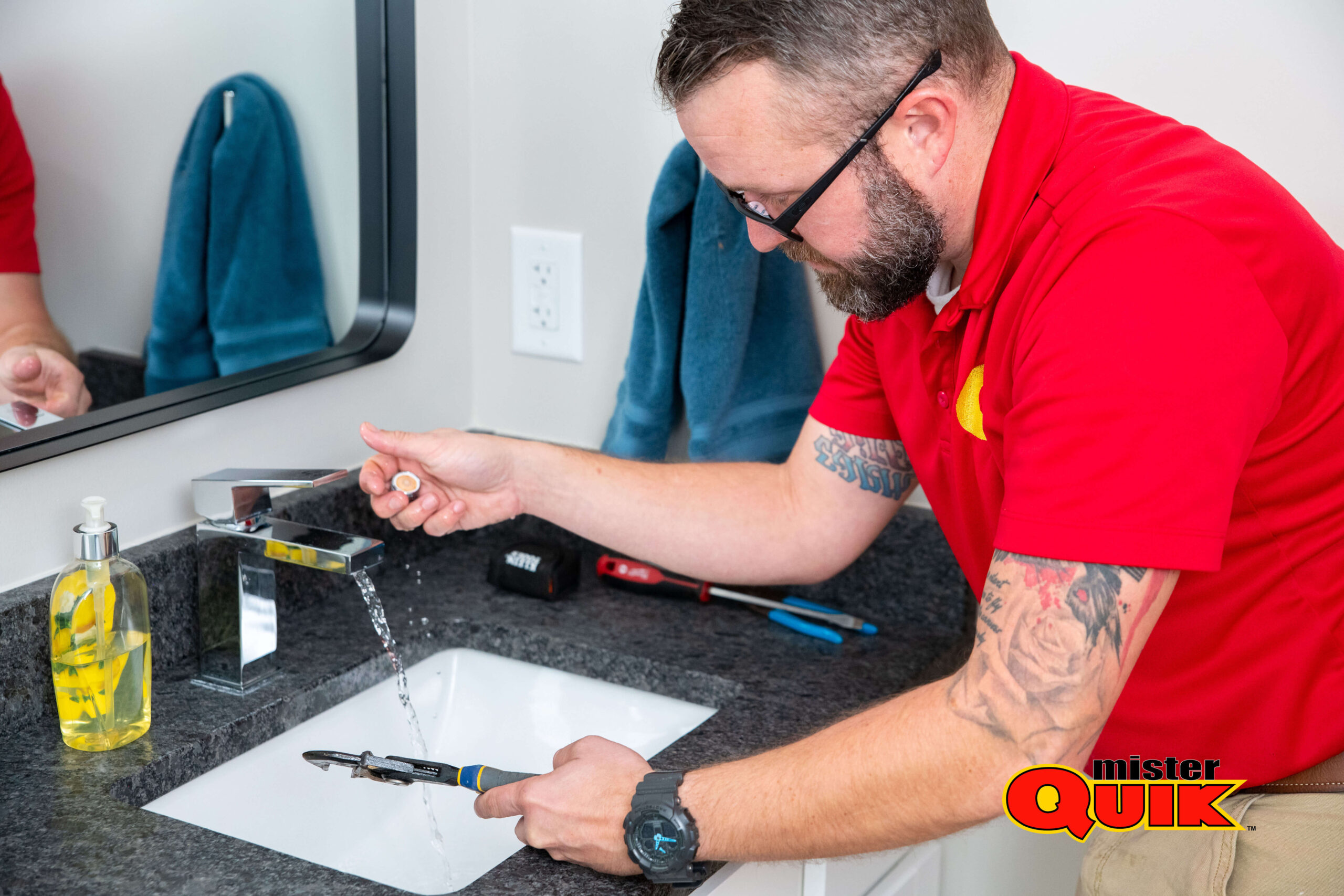Water Heater Plumbing Near Me
Schedule on your own without making a call. Click the button below to get started!

Water Heater Repair
Water heater issues can disrupt your daily routine and cause inconvenience. Mister Quik Home Services offers reliable water heater repair services to ensure your home stays comfortable. Here’s what you should know:
1. Common Problems: Water heaters can encounter various issues, such as leaks, lack of hot water, strange noises, or rusty water. Our skilled plumbers are experienced in diagnosing and fixing these problems promptly.
2. Diagnosis Process: When you contact us for water heater plumbing assistance, our technicians will conduct a thorough inspection to identify the root cause of the issue. We use advanced diagnostic tools to pinpoint the problem accurately.
3. Repair Solutions: Depending on the issue, our plumbers will recommend the most suitable repair solutions. Whether it’s replacing a faulty heating element, fixing a leaky tank, or flushing out sediment buildup, we’ll ensure your water heater functions efficiently again.
4. Quality Parts and Materials: We use high-quality parts and materials for water heater repairs to ensure long-lasting results. Our goal is to provide reliable solutions that extend the lifespan of your water heater and minimize the need for future repairs.
5. Preventive Maintenance: Regular maintenance is essential for preventing water heater problems. Our maintenance services include flushing the tank, inspecting components for wear and tear, and adjusting settings for optimal performance. By scheduling routine maintenance, you can prolong the life of your water heater and avoid costly repairs.
Whether your water heater is experiencing minor issues or a major malfunction, Mister Quik Home Services is here to help. Contact us for expert water heater repair services, and we’ll send our skilled plumbers to resolve the problem efficiently.
Water Heater Price
Water heaters play a crucial role in providing hot water for your home, but understanding their prices can be daunting. Here’s a breakdown of water heater prices:
There are various types of water heaters available, including traditional tank heaters, tankless heaters, and heat pump heaters. Each type comes with its own set of features and price points.
The initial cost of a water heater depends on factors such as its type, size, and brand. Tankless water heaters, for example, typically have a higher upfront cost than traditional tank heaters due to their advanced technology.
In addition to the cost of the water heater itself, you'll need to consider installation expenses. Factors such as the complexity of installation, location, and any necessary upgrades to your plumbing system can impact installation costs.
Energy-efficient water heaters may have a higher upfront cost but can save you money on utility bills in the long run. Consider the energy efficiency rating of a water heater when evaluating its price.
While purchasing a water heater, consider the long-term maintenance and repair costs. Opting for a quality water heater and scheduling regular maintenance can help prevent costly repairs in the future.
A water heater is a device designed to heat water for residential or commercial use. It typically consists of a tank or a tankless unit that heats water using electricity, gas, or another fuel source. The heated water is stored in the tank or instantly delivered for various purposes such as bathing, cooking, or cleaning. Water heaters come in different sizes and types to accommodate the specific needs and preferences of users. Regular maintenance is essential to ensure efficient operation and prolong the lifespan of the water heater.
The average labor cost to install a 50-gallon gas water heater typically depends on various factors such as location, complexity of installation, and the contractor’s rates. On average, homeowners can expect to pay a moderate to high amount for labor, which usually includes the removal of the old water heater, installation of the new unit, any necessary adjustments to plumbing or gas lines, and testing to ensure proper functionality. Prices may vary significantly, so it’s advisable to obtain quotes from reputable contractors in your area before proceeding with the installation.
While it’s possible to install a water heater yourself, hiring a professional plumber is highly recommended due to the complexities involved. Plumbers possess the necessary expertise to ensure proper installation, which includes assessing the site, connecting the necessary pipes, ensuring compliance with building codes, and addressing any potential issues that may arise. Additionally, professional installation can help prevent future problems and ensure the efficient and safe operation of your water heater, ultimately saving you time and potential headaches.
Yes, you can still use water if the water heater is leaking, but it’s important to address the issue promptly to avoid further damage. Depending on the severity of the leak, you may need to temporarily shut off the water supply to the heater to prevent more leakage. Additionally, you might consider placing a container underneath the leak to catch the water and minimize damage to the surrounding area. It’s advisable to contact a professional plumber to assess and repair the leak as soon as possible to ensure the safe and efficient functioning of your water heater.
Deciding whether to replace your 20-year-old water heater depends on various factors including its efficiency, current condition, and potential maintenance costs. Typically, older water heaters may become less efficient over time, leading to increased energy consumption and higher utility bills. Additionally, as water heaters age, the risk of leaks and malfunctions tends to rise, potentially causing water damage or inconvenience. Assessing the cost of repairs versus the investment in a new, more efficient unit can help determine the most economical and practical decision for your household’s needs and budget.
Hot Water Heater Installation
Installing a hot water heater is a significant investment in your home’s comfort. At Mister Quik Home Services, we’re here to guide you through the process. Here’s what you need to know about hot water heater installation:

Assessment and Consultation: Our first step is to assess your home’s hot water needs and provide a consultation. We’ll discuss factors such as the size of your household, your daily hot water usage, and any preferences you have for the type of water heater.
2. Choosing the Right Type: There are different types of water heaters available, including traditional tank heaters, and tankless heaters. We’ll help you choose the right type based on factors like energy efficiency, space constraints, and budget.
3. Sizing: Proper sizing of the water heater is crucial for ensuring adequate hot water supply. Our experts will calculate the appropriate size based on your household’s needs and recommend a water heater that meets those requirements.
4. Installation Process: Once you’ve selected the water heater, our skilled technicians will handle the installation process with precision and care. We’ll ensure that the water heater is installed correctly, following all safety protocols and local building codes.
5. Testing and Inspection: After installation, we’ll test the water heater to ensure it’s functioning correctly and inspect for any leaks or issues. Our goal is to guarantee that your new water heater is operating efficiently and reliably.
At Mister Quik Home Services, we’re committed to providing top-notch water heater plumbing services, from installation to maintenance and repairs. Trust us for professional and dependable hot water heater installation that meets your needs and exceeds your expectations.
Water Heater Leaking
A leaking water heater can cause stress and potential damage to your home. At Mister Quik Home Services, we’re here to provide you with essential information on how to handle this situation:

The first step is to locate the source of the leak. Check around the water heater for signs of water pooling, dripping, or dampness. Common areas for leaks include the tank itself, fittings, valves, and pipes connected to the water heater plumbing.

If you discover a leak, it's crucial to shut off the water supply to the water heater immediately. This can help prevent further water damage and flooding in your home. Locate the shut-off valve near the water heater and turn it clockwise to close it.

Once the water supply is turned off, assess the extent of the damage caused by the leak. Check for any water damage to surrounding areas, such as walls, floors, and belongings. It's essential to address any water damage promptly to prevent mold growth and structural issues.

After shutting off the water and assessing the damage, it's time to contact a professional plumber specializing in water heaters. Mister Quik Home Services offers expert assistance in diagnosing and repairing water heaters. Our skilled technicians will inspect the water heater, identify the cause of the leak, and recommend the necessary repairs.
Water Heater Plumbing Connections
Water heater plumbing connections are essential components that ensure your water heater functions properly. Here’s what you need to know:
1. Inlet and Outlet Pipes: Water heaters have inlet and outlet pipes that supply cold water into the tank and distribute hot water throughout your home. These pipes connect to the water heater and are crucial for the proper flow of water.
2. Pressure Relief Valve: The pressure relief valve is a safety feature that prevents the water heater from building up too much pressure, which could lead to explosions or leaks. It’s connected to the water heater tank and releases excess pressure when necessary.
3. Temperature and Pressure Relief (TPR) Valve: Similar to the pressure relief valve, the TPR valve helps regulate the temperature and pressure inside the water heater tank. It’s connected to a discharge pipe that directs excess water safely away from the tank.
4. Gas or Electric Connections: Depending on the type of water heater, there will be gas or electric connections for heating the water. Gas water heaters have a gas supply line and a burner assembly, while electric water heaters have electrical connections for heating elements.
Water Heater Plumbing Code
Water heater plumbing codes are regulations set by local authorities to ensure the safe installation and operation of water heaters in residential and commercial buildings. Here’s what you need to know:
Water heater plumbing codes outline specific safety standards that must be followed during the installation, repair, and maintenance of water heaters. These standards help prevent accidents, such as fires, explosions, or gas leaks, by ensuring that water heaters are installed correctly and in compliance with building codes.
Plumbing codes specify where water heaters can be installed within a building, taking into account factors such as ventilation, clearance space, and proximity to combustible materials. For example, water heaters typically cannot be installed in closets or bedrooms and must be placed in well-ventilated areas.
Proper venting is essential for gas-fired water heaters to safely exhaust combustion gasses. Plumbing codes dictate the size, location, and type of venting required to prevent the buildup of harmful gasses like carbon monoxide inside the building.
Plumbing codes mandate the installation of pressure relief valves on water heaters to prevent excessive pressure buildup inside the tank. These valves must be properly sized, installed, and maintained to ensure they function correctly in case of an emergency.
Compliance with water heater plumbing codes often requires obtaining permits and undergoing inspections by local building authorities. This ensures that water heaters are installed correctly and meet all necessary safety standards before being put into operation.
Understanding water heater plumbing codes is essential for homeowners and contractors alike to ensure the safe and legal installation of water heaters. At Mister Quik Home Services, our experienced plumbers are well-versed in local plumbing codes and can ensure that your water heater installation meets all necessary requirements.
- Check for leaks around the water heater tank, fittings, valves, and pipes connected to the water heater plumbing.
- Note any signs of water pooling, dripping, or dampness to pinpoint the source of the issue.
- Locate the shut-off valve near the water heater and turn it clockwise to close off the water supply.
- This step helps prevent further water damage and flooding in your home.
- Evaluate the extent of water damage to surrounding areas, such as walls, floors, and belongings.
- Promptly address any water damage to prevent mold growth and structural issues.
- Reach out to a professional plumber specializing in water heater plumbing, like Mister Quik Home Services, for assistance.
- Our skilled technicians can inspect the water heater, identify the cause of the leak, and recommend necessary repairs.
- Schedule regular maintenance for your water heater, including flushing the tank and inspecting for corrosion or rust.
- Consider installing a water leak detection system to alert you to any leaks early on, minimizing potential damage.








